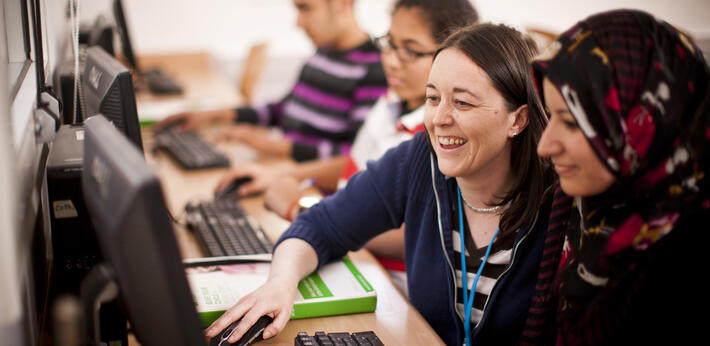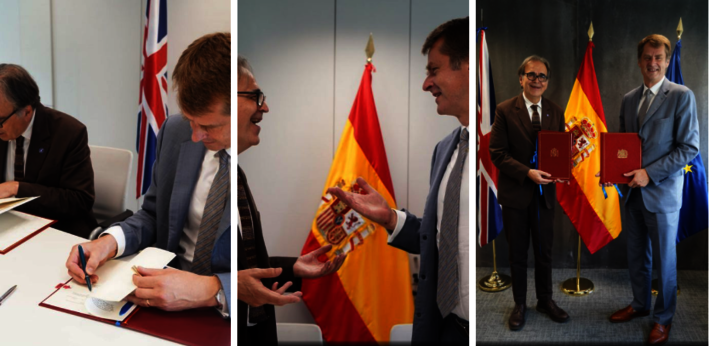You are here
Home ›09/09/2020
Europe - Covid-19 update - 9 September 2020
Since early April, we have been running this update on how education systems in the EU Europe region are responding to the Covid-19 pandemic. We focus on how different countries are dealing with the challenges that the virus has placed on schools and universities, including how they are managing school leavers' and university entry examinations, and the different country contexts across Europe. For more information, updates, webinars and other engagement opportunities, please see ‘Europe and education: Stay connected during Covid-19’.
We focus on ten priority countries: Bulgaria, Cyprus, France, Germany, Greece, Italy, Ireland, Poland, Romania and Spain. This week: France, Ireland and Romania.
- France: Recovery plan commits billions of euros to HE and research; Parcoursup 2020 (clearing procedure) extended by 11 days.
- Ireland: Predicted grades-based results for Leaving Certificate return higher grades than previous years.
- Romania: Schools to return on 14 September.
If a country you’re interested in doesn’t appear here, or if you would like more details, please check past updates or contact the country representative.
We have restarted English examinations in 30 countries in Europe. For the latest update by country, please check: https://www.ielts.org/news/2020/changes-to-ielts-test-arrangements-in-some-locations-due-to-novel-coronavirus.
If you have any feedback, please contact me or any of the country staff listed below.
Thank you - and stay safe.
Almut Caspary – Higher Education and Research Lead, EU Europe (Almut.Caspary@britishcouncil.org).
Updated 9 September
The French Prime Minister Jean Castex announced the France Relance recovery plan on 3 September, with a total budget of €100 billion. Resources dedicated to HE and research within this plan are:
- €2.55 billion for financing the HE and research ecosystem and the valorisation of research
- €6.7 billion for training and youth employment 'aimed at providing a solution for each of the 750,000 young people entering the labour market at the moment'
- €7 billion by 2030 to make France 'a leading country' in green hydrogen energy
- €4 billion devoted to the renovation of public buildings, in particular those of universities and research laboratories which will benefit from resources from the recovery plan
- Nearly €400 million for the ANR (French equivalent of UKRI) from European Union funding
- €300 million to preserve R&D jobs in private companies, in particular by making them available in public laboratories and to support the employment of young graduates and post-docs
- €130 million of subsidies to CNES (French government space research organisation) in 2021
- €16 million per year to strengthen the state guaranteed system for student loans
France Relance has three parts:
- Ecological transition: €30 billion, more than doubling the investments that the state usually devotes to the environment over the next two years
- Business competitiveness for France: €35 billion
- Strengthening social and territorial cohesion: €35 billion
School and university closures
All schools and most HEIs have now reopened. A school or an HEI can close completely for 14 days if three cases of Covid are been discovered. This quarantine period may be reduced to seven days in the next few days by the government, depending on scientific advice.
Examinations
The complementary phase of the Parcoursup 2020 procedure (equivalent to UCAS Clearing Plus) has been extended until 24 September from its original closing date of 13 September.
Remote and online academic provision
Twelve French universities have decided to mutualise their teaching resources as part of a new network. The project will be funded by the government.
International students
In terms of inward student mobility to France, applications from first-time graduates are relatively stable at the start of the 2020 school year, with around 20,000 to 30,000 students. Most students are from French-speaking African countries. There has been a drop of about a quarter in students from Latin America and Asia.
However, the flow of arrivals is quite low, in particular because of the time it takes to issue visas. This is despite the fact that study visas have been prioritised and diplomatic posts are working very hard to process demand.
In addition to delays in issuing visas, there are delays and withdrawals for two other reasons:
- The cost of transport, mainly air, which is extremely high. This is leading some students to give up or seek cheaper alternatives.
- The postponement of the baccalaureate or equivalent exams in eight or nine countries, such as Algeria where exams were moved to September. These students cannot come at this time as their files have not yet been processed.
Faced with these delays, French HEIs are setting up personalised support via a relay in the teaching teams, responsible for interacting directly with affected students. These systems are reinforced by tutoring, including a 'buddy' sponsorship system.
Universities are also worried about returning graduate students who went home during the holidays or during confinement and may now face difficulties returning to France.
For mobility within the framework of exchange programmes (including Erasmus +, which represents 45 to 50,000 students), French universities have encouraged students to postpone their mobility to the second semester of the academic year. This will surely result in a postponement to the following year.
The CPU (French university chancellors association) has committed to welcoming international students until 15 October. The CROUS (in charge of student accommodation) has also undertaken to put in place an agreement with universities to maintain a reserve of accommodation for international students. The Health Insurance Fund indicated on 31 August that PCR tests for Covid-19 will be free for all audiences, including international students.
Contact
For more information about France, please contact Catherine Saracco (Catherine.Saracco@britishcouncil.fr).
Ireland has seen a recent increase in Covid-19 cases, meaning there are still restrictions in place for both indoor and outdoor gatherings. It is anticipated that these restrictions will remain for the foreseeable future but adjustments for various elements and types of events will be continue to be made regularly. The publication of predicted grades for final school exams and the allocation of place at third level institutions will dominate education discourse for the coming weeks.
School and university closures
All primary and post-primary schools have reopened. There have been a handful of class or small school closures due to Covid-19 case,s but otherwise schools are functioning well with social distancing and other new ways of working. Post-primary students must wear masks in school.
Examinations
Final school examinations (Leaving Certificate) results were released to students on Monoday 7 September. Grades, based on predictions by teachers, were higher than in previous years. The standardisation process resulted in approximately 20 per cent of grades being adjusted downwards, but despite this, average grades across all subjects and levels increased by 4.4 percentage points on last year. This increase is most visible in top grades in higher level subjects. Students may choose to accept the grades as announced today or sit a rescheduled series of exams in November. The first round of third level offers will be made through the CAO system on Friday. Uncertainty about students deferring their place, the numbers of international students coming to Ireland and other factors means that many institutions anticipate a long period of allocation and offers as they move through the rounds.
Student financial support
Student Unions and other groups have criticised the level of costs for students at universities this year; many question the breakdown of charges, given that students will have limited time on campus. In addition, students have expressed concern about housing and accommodation; they have asked universities to clarify the percentage of time they will be expected to attend in person so they can decide what accommodation is needed for this academic year.
Remote and online academic provision
Third level institutions appear to be preparing for a higher proportion of teaching to take place online, though few have confirmed publicly what percentage this will be. Primary and post-primary education institutions are prioritising in-person teaching. The level of planning and provision for online teaching in the event of school closures is being left to individual schools to resolve.
International students
It is unclear how high take-up of places by international students will be this year. In typically popular disciplines for international students, such as medicine, institutions are working on solutions such as arranging and meeting the costs of flights to Ireland for students. However universities overall are anticipating a sharp drop in international student numbers.
Communication with students
The original moderation process for the Leaving Certificate was adjusted after students and teachers questioned how past grades from a school would influence this year's results. The lighter process applied has been broadly welcomed and seems to have avoided the difficulties faced by the predicted grades systems in UK and elsewhere. However, students continue to ask for greater clarity about how teaching and learning will be delivered this year and how it will affect their lives.
British Council activity
The British Council office in Dublin is open by appointment.
Other insights
A female academic from UCD spoke publicly about being the victim of a sustained and serious campaign of sexual harassment by another academic at the university. It has resulted in a prosecution for the perpetrator but the victim has expressed a high level of frustration with the university who appear to have done little to stop it, despite her reporting of a multitude of instances. Following extensive media coverage this weekend, the Minister for Higher Education has publicly called on both the university and other agencies such as the Higher Education Authority to improve their response and to agree a ‘zero tolerance’ approach to sexual harassment. Reporting of the case has prompted other victims of the harassment to share their own stories.
Further information
9thlevel.ie – Updated digest of articles related to HE in Ireland updated very regularly. Also includes articles with a Northern Ireland focus.
Contact
For more information about Ireland, please contact Mags Walsh mags.walsh@ie.britishcouncil.org.
Updated 8 September
Two rounds of elections are scheduled in Romania, on 27 September and 6 December. The Social Democrats (SDP), Romania’s largest party, are trailing badly in opinion polls to the Liberal Party (PNL). PNL are currently heading up a minority government.
Romania’s Prime Minister Ludovic Orban has confirmed that students will return to state schools on 14 September, with the method of teaching dependent on the number of Covid-19 cases in each area, but where possible in a face-to-face environment. Orban said that he believed children 'are safer at school', saying: 'In the holidays they had more interaction than they will have at school. The way schools open will depend on the spread of the virus.'
On Monday 7 September, the Health Ministry issued an epidemiological analysis of the incidence rate of Covid-19 infections per one thousand inhabitants per county and locality in Romania. This list will decide how each school will function, guided by three scenarios:
- Green: Less than one case per 1,000 inhabitants in the last 14 days. All pupils can return school following protection rules (face masks, distancing, disinfection, etc.).
- Yellow: Between one and three cases per 1,000 inhabitants. All pre-school and primary school pupils between the eighth and 12th grade come to school on a daily basis, observing all protection rules. Other elementary and high school students will partially return to classes on one- to two-week rotations.
- Red: More than three cases per 1,000 inhabitants: All pupils take only online classes.
Each school’s managing board must decide on one of these three scenarios by 10 September. In reality, many schools are expected to start in a hybrid formula, especially in big cities such as Bucharest, Cluj, Lasi, Constanta, Brasov and Oradea, where the infection rate is higher than 1 per 1,000 inhabitants.
Parents, teachers, and trade unions have expressed doubts as to ether it is safe to reopen schools as Romania has seen a surge in coronavirus cases in recent weeks. The opposition Social Democrats have criticised government for 'dithering' about how students will return to school. They suggest that the new school year should have been delayed, along with the two rounds of elections scheduled.
Reopening of higher education institutions will be decided by each university board in line with the Romanian government's Covid-19 regulations and guidelines received from the Ministry of Education. Most universities plan to organise lectures and seminars online, but ask students to be present in person for attending laboratories and other practical sessions on campus.
Contact
For more information about Romania, please contact Gabriel Ivan (Gabriel.Ivan@britishcouncil.ro).
- Bulgaria: Ivaylo.Slavov@britishcouncil.bg
- Cyprus: pantelitsa.michael@cy.britishcouncil.org
- France: Catherine.Saracco@britishcouncil.fr
- Germany: ailsa.kienberger@britishcouncil.de
- Greece: Maria.Tsakali@britishcouncil.gr
- Italy: Filomena.Casamassa@BritishCouncil.it
- Ireland: Mags.Walsh@ie.britishcouncil.org
- Poland: Julia.Plachecka@britishcouncil.pl
- Romania: gabriel.ivan@britishcouncil.ro
- Spain: Carolina.Jimenez@britishcouncil.es
- 2 September: France, Germany, Greece, Italy, Spain
- 28 July: Bulgaria, France, Germany, Italy, Romania, Spain
- 8 July: France, Germany, Italy, Romania
- 1 July: Germany, Greece, Ireland, Romania
- 24 June: Bulgaria, Cyprus, Germany, France, Romania, Spain
- 10 June: France, Germany, Ireland, Romania, Spain
- 3 June: France, Germany, Greece, Ireland, Italy, Romania
- 27 May: France, Germany, Ireland, Italy, Romania, Spain
- 20 May: Bulgaria, Cyprus, Germany, Greece, Ireland, Poland, Romania, Spain
- 13 May: Cyprus, France, Germany, Italy, Ireland, Romania, Spain
- 6 May: Bulgaria, Cyprus, France, Germany, Greece, Romania
- 29 April: Cyprus, France, Germany, Greece, Italy, Poland, Romania
- 22 April: Germany, Greece, Spain
- 16 April: Bulgaria, Cyprus, France, Romania
- 8 April: Bulgaria, Cyprus, France, Greece, Italy, Poland, Romania, Spain






